CELEBRATING THE LIFE OF PAUL STENHOUSE MSC
There was a memorial vigil and sharing of stories at Kensington Monastery.
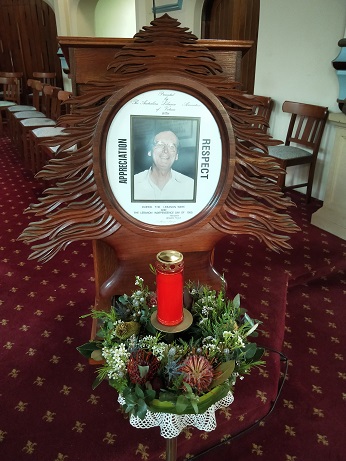
The Requiem Mass was held at Our Lady of the Rosary Church, Kensington,
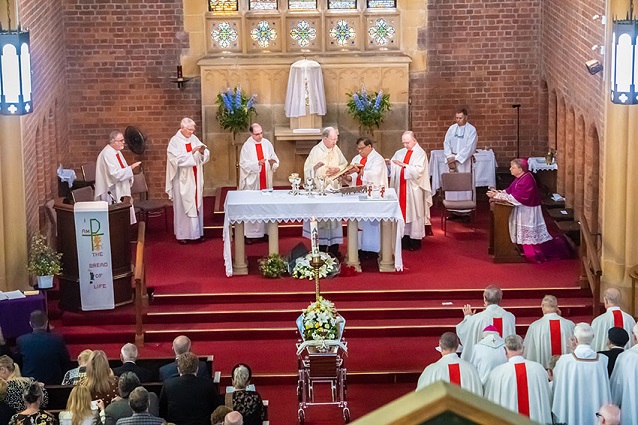
many MSC Confreres, Paul’s brother, Richard, and his family, a church full of friends, celebrant Jim Littleton with homily, eulogy by Michael Fallon. Archbishop Anthony Fisher OP was present in the sanctuary and offered the commendation.
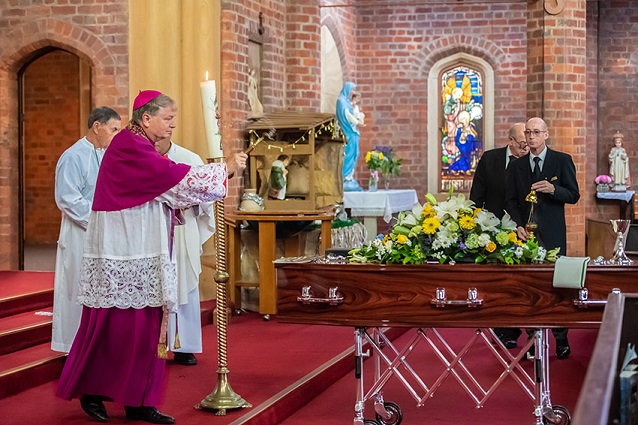
With thanks to the Catholic Weekly for the photos here. For quite a tribute, go to the Catholic Weekly for description of the Mass and more photos:
https://www.catholicweekly.com.au/humble-intellectual-fr-paul-stenhouse-farewelled/
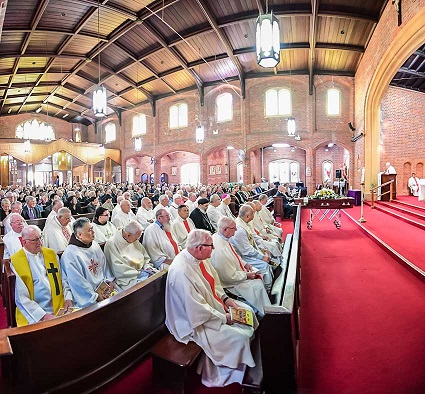
Some reflections and tributes.
From the Eulogy: Michael Fallon MSC
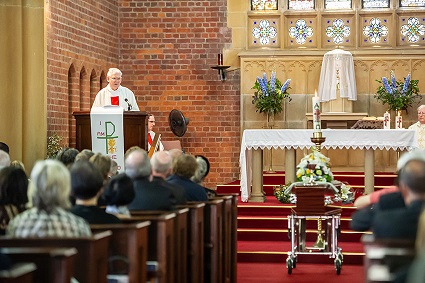
Paul’s Mind – a tribute to his outstanding abilities.
In 1973 Paul received a B.A. (Hons.) from the University of Sydney majoring in Samaritan Studies and Arabic. He produced a critical edition and translation of the historical sections of the Samaritan Hebrew Hilukh, a purity code. In 1982 he received a Ph.D. from the University of Sydney for his Critical Edition of the Middle Arabic Text of the Samaritan Chronicle of Abu ’l-Fath. It is worth noting that before Paul could produce a commentary on the text, he had to translate it, and before he could translate he had to rediscover the dictionary and grammar for medieval Samaritan. As a result Paul’s Ph.D. is three volumes, and took years to be examined, because he was the only person who knew this area in detail.
Paul was a foundation member of the Council of the Société d’Études Samaritaines within the Collège de France, Paris. He has delivered papers at Colloquia organised by the Société, held in Paris, Tel Aviv and Jerusalem, Oxford, Venice, Helsinki, Budapest, Zurich and Tartu, Estonia. Paul wrote the article on ‘Samaritans’ for the Encyclopaedia of the Qur’ān, June 2002.
Paul was awarded an honorary doctorate by the University of Notre Dame, and also by the Catholic University. Paul has written and lectured extensively on Middle Eastern Politics and history. His special interest over the past forty years has been Lebanon/Syria, and the Balkans.
In 1988 he received an M.A. (Hons.) from the University of New England for a Literary Biography of John Farrell, Paul’s great-grandfather, a 19th Century Australian journalist and reformer. Scholarly Press Melbourne published Paul’s book on John Farrell last year, and his book on Islam, context and complexity this year. Paul worked generously and untiringly right to the end.
We thank God for the gift we have shared in knowing Paul. His intellect was amazing. His commitment to pursue truth, and to share what he discovered so honestly and thoroughly over the past 56 years since his ordination have been awe-inspiring. His respect for those who formed judgments that differed from his was admirable, but I don’t think it is too strong to say that he hated the all-pervasive laziness that claims that there is no such thing as truth, and that one opinion is as good as another. We may not agree with everything Paul said or wrote, but we have to admire his research displayed in the thoroughness in which he footnoted every statement.
Paul’s Heart – a tribute to his extensive pastoral outreach
I could go on forever speaking of his amazing mind. But he did have an even greater gift: his heart. I don’t know a hundredth of it, and I am sure everyone here this morning would have many stories to tell. I don’t know of anyone who experienced need and turned to Paul who did not experience his loving, practical and committed care. One example, which perhaps some of you had first hand experience of, was his care for international students, and migrants more generally. Paul would meet people at the airport, deliver them to appointments, find them accommodation, accompany them to immigration tribunals, badger university administrations – and any academic who he thought could help – on their behalf. He also took on the role of reassuring anxious parents, worried about their children overseas. And finally of course he could marry them and baptize their children. Paul was, indeed, a Missionary of the Sacred Heart of Jesus. It was from his faith in God as revealed in the heart of Jesus that Paul got his inspiration. I can hear Paul in something John Henry Newman, recently canonized wrote: ‘I do not care to overcome people’s reason without touching their hearts’ (A Grammar of Assent). Paul’s heart was as big as the world. In 1997 he was appointed Chairman of the Australian Office of the world-wide organization Aid to the Church in Need. We can appreciate Paul’s mind. It may not have been as apparent that his mind was guided, in ways that Paul himself may not have realized, by his sensitive heart. He agonized even to think that he might hurt someone or let someone down.
I would like now to quote from Pope Francis’s reflection at the close of the Year of Mercy: ‘Our life with its joys and sorrows is something unique and unrepeatable, that takes place under the merciful gaze of God. This demands, especially of priests, a careful, far-sighted spiritual discernment, so that everyone, none excluded, can feel accepted by God, participate actively in the community and be part of the People of God which journeys tirelessly towards the fullness of God’s kingdom of justice, love, forgiveness and mercy.’ Thank you, Paul, for showing this to us.
I conclude by returning to the Annals and giving the final word to dear Paul who writes in the final edition of the Annals, completed only a few days ago. I quote: ‘In a poem of Dame Mary Gilmore's 'By the Roadside', printed for the first time in Annals (December, 1926) we can find a crystallising of the aims of this most Australian of Catholic Magazines. Paul then quotes from the poem: ‘Wonder is dead, you say! /Wonder can never die/ Not while within a shining pool / A man can see the sky.’ Paul goes on: ‘It is as a shining pool reflecting the wonders of God and God’s creation that Annals should be remembered. Age could do little to mar the image that it reflects.’ It is somehow fitting that after almost 50 years as editor of Annals Paul managed to contribute to and edit the final addition of the magazine as he was dying.
At the Last Supper Jesus prayed: ‘Father, I want those you have given me to be with me where I am … May the love with which you loved me be with them, so that I too may be with them.’ Paul, you have known this love, and you have revealed it to us. Till we meet again dear friend in the mystery of God’s love, we bid you farewell and thank you for the gift and inspiration you have been to us all. Thank you for your love.
From the homily: Jim Littleton MSC
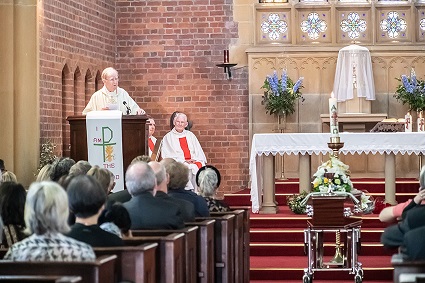
The scripture readings for this Requiem Mass have been chosen by Michael Fallon and myself. They are not customary readings for such a liturgy but I believe that they typify Paul in many ways. Let me begin with the opening phrase of the extract from the Letter to the Philippians: “There is no need to worry; but if there is anything you need, pray for it.”
In the production of the Annals and in his ministry to young Asian students Paul encountered many problems both institutional and financial. Yet he had a trust in God that things would work out and they did. The Letter to the Philippians continues with the exhortation to “fill your minds with everything that is true, everything that is noble, everything that is good and pure”.
Paul Stenhouse knew much more about Middle Eastern religions and politics than the average journalist, he was a great searcher for the truth and proclaimed it fearlessly. His erudition was quite remarkable, and I rarely argued with him on controversial issues, for I know that I would lose the argument.
The extract from the Letter to the Philippians concludes with the statement by St Paul that if his readers followed his exhortations the God of Peace would be with them. By trying to do everything that was noble, good and pure, Paul Stenhouse would have experienced that peace, as in fact we all do when we try to live those ideals. Certainly, there would have been great peace in Paul’s heart two weeks ago when he completed the last issue of the Annals.
This morning’s reading from the Gospel of St Mark begins with the phrase: “The apostles rejoined Jesus and told him all that they had done and taught”. Jesus had commissioned them to go out in pairs to the villages in Galilee and proclaim his message. It had been a busy time for them, but they were pleased with their efforts and amazed at the miracles that accompanied their work.
We chose this gospel reading because Paul Stenhouse also had a very busy life of ministry to people who sought assistance. There was rarely a day when he was not out of the monastery involved in some sort of ministry while at the same time finding time to prepare another issue of the Annals.
The gospel story continues with the decision by Jesus to take the apostles to a quiet place where, in today’s parlance, they could have a debriefing session. But the crowds followed them and we are told that Jesus “took pity on the crowds because they were like sheep without a shepherd and he set himself to teach them at some length”. That compassionate attitude to people also typified Paul Stenhouse’s life. He was always willing to respond to any sort of need, any request for help.
So today, we are celebrating the life of a remarkable Missionary of the Sacred Heart. Not only was Paul extremely erudite but he used that gift to bring learning to other people. At the same time, as Michael Fallon said, if anyone turned to Paul experiencing need they also experienced his loving, practical and committed care.
He was able to do this because his heart was filled with love for God, Jesus was central to his life. He lived out in his own unique way a Spirituality of the Heart.
____________________________
At Douglas Park before the burial, Peter Malone spoke of Paul’s creativity in the 1960s and 1970s with the Annals, ten years of topical Catechetical Supplements and Teachers’ Guides, the founding of Chevalier Press, the many books and booklets and Compass Theology Review. He also reminded us of the ‘ordinary’ Paul, visits to McDonald’s, choice of action films over art-house – and (with thanks to Carl Jung) his decisive actions and achievements, of the energy he gained as a strong extrovert, from so many situations, from engaging with so many people, a man of intuitions and connections, a very personal face to the world.
At heart and in mind and action, he was also an old-style apologist, explaining and defending the faith, a love of the traditions and history of the Church.
